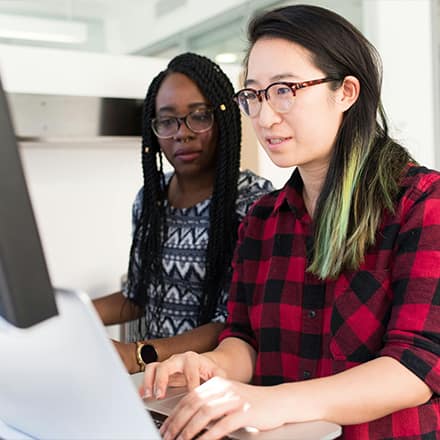Why Do You Want to be a Software Developer?

Chrystal Woodcock is passionate about earning her BS in Information Technologies with a concentration in software development. The fuel for her passion? The desire to create better educational tools for future generations of elementary school students. It's a goal the California native and library media technician gets closer to every day. We caught up with Chrystal at the 2016 Grace Hopper Celebration of Women in Computing, where she took part in Open Source Day: Code-a-thon for Humanity and learned how to use open-source software to help those in need.
Why do you want to be a software developer?
I've spent the last 10 years as an elementary school library media technician, fostering a love of reading in children and assisting students and teachers in the use of technology. Based on my experiences, I began looking toward a career in developing educational software. Why SNHU? Because it was the only university that checked all the boxes - the program I wanted and the flexibility I needed as a full-time working professional.
Was there an underlying desire to do good with your degree or did that develop as you got deeper into your program?
My time in the library has given me a unique opportunity to see the way young children interact with software. I've watched the frustration build in educators as their students struggled until they abandoned the software altogether. I've looked on as young children were expected to access learning resources by means of login protocols that were far too developmentally advanced for them. I've seen learning time squandered as these children tried to interpret interfaces packed with content they couldn't even read, let alone type. I know that by combining the right skills and connections with my knowledge and experience, I can improve educational technology resources for future generations of students.
Can you talk about how you've applied what you're learning in the classroom to your daily work as a library media technician?
In my position as a librarian, I speak with hundreds of girls between the ages of 5 and 11 every week. I've already shared so many of my own exciting SNHU experiences with them, like creating my own computer game in IT-135. The excitement this raised led to girls and boys telling me they wanted to create their own games someday. From there, a tech-savvy teacher and I started with a small fourth- grade coding group that grew into a school-wide Hour of Code event. And that, in turn, grew into a free after-school Robotics Club attended by 50% of third through fifth graders, a third of whom were girls.
On that note, tell us about your experience at this year's Grace Hopper conference, both as a woman and as someone seeking to make a difference with your degree.
I knew it would be an opportunity to get some experience programming with others, but I had no idea what amazing work the 300 of us would accomplish in a day. I worked with Microsoft and Humanitarian Toolbox on a project called allReady. The allReady project has been developed in conjunction with the Red Cross, which responds to 1,200 disasters a year in the city of Chicago alone. During the winter in poor areas of Chicago, families resort to pretty much anything to stay warm, which can sometimes result in house or apartment res. The Red Cross is trying to lower the number of incidents the community suffers each year by investing in prevention programs. The web app allReady will be an organizational tool to organize events and volunteers. Our contribution to the project came in the form of fixing and debugging issues with the application. Our group was able to fix five bugs by the end of the hackathon. It's really an incredible feeling to give your time for such a worthy cause and know that the more you practice your own programming skills, the better prepared you'll be to aid other nonprofits in the future.
So what's next for you?
I focused my degree program on software development, because I'm looking toward a career in developing educational software. The work I'll be able to accomplish by learning new skills, creating personal connections and exploring possibilities in technology could lead to better educations for many, many young people.
Betty Eagan ‘17 is a freelance copywriter with 25+ years of experience across a diverse spectrum of industry sectors, including higher education. She lives and works remotely from the mountains of northern New Hampshire. Connect with her on LinkedIn.
Explore more content like this article

Types of IT Jobs

What is Hour of Code? A Chance to Kickstart Your Coding Literacy

SNHU Spotlight: Adaecus Brooks, BA in Graphic Design and Media Arts Grad
About Southern New Hampshire University

SNHU is a nonprofit, accredited university with a mission to make high-quality education more accessible and affordable for everyone.
Founded in 1932, and online since 1995, we’ve helped countless students reach their goals with flexible, career-focused programs. Our 300-acre campus in Manchester, NH is home to over 3,000 students, and we serve over 135,000 students online. Visit our about SNHU page to learn more about our mission, accreditations, leadership team, national recognitions and awards.

